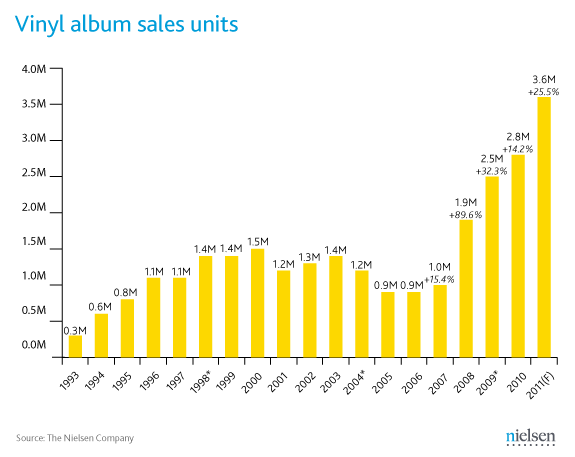A little while back, the results of a survey commissioned by the subscription online music store eMusic were released, and they were notable.
The survey targeted people who buy music online. Among the findings:
89 percent of respondents said they would rather own the music they like than stream it
86 percent said that owning the music gives them security that their files will not disappear
79 percent said that they don’t think they will ever abandon ownership for streaming
76 percent said they use streaming to discover music and to decide whether they will buy it
These aren’t just iffy numbers, these are landslide numbers.

And yes, this survey was sponsored by eMusic, a company with a business model based on paid downloads. Yes, it was a survey of online music buyers. As a result, on web sites that reported on the survey, commenters insisting the survey is bullshit were not hard to find.
The music industry site Music Ally itself put it this way: “Company whose business model is built around downloads rather than streaming releases research claiming music fans prefer downloads to streaming— shock!”
Okay, then, where’s the shock when a man whose business is built around streaming claims that the future of music is access not ownership? I saw no such blowback when Daniel Ek went on his media blitz in July as Spotify arrived in the U.S.
don’t the opinions of online music buyers matter?
The respondents in the survey were online music buyers, sure, but don’t the opinions of online music buyers matter? Rather than scoff at them, I should think that musicians and music-industry pundits alike should be very interested in them.
The mere fact that online music buyers exist, and actually in very large numbers, means that the opinions of this group should be noted and reckoned with, not brushed aside simply because they don’t align with the grand vision of Music in the Cloud.
And speaking of absent skepticism, where is the skepticism that greets the opinions of those whose livelihood depends upon promoting the cloud as the future of music? There are any number of pundits and consultants who go around talking about this and making a pretty penny in the process. (They make more money than the vast majority of the musicians providing the cloud with the music, but that’s another story.)
Why do we accept the pronouncements of these folks with any less skepticism than the eMusic survey was greeted?
Why are we trained not to listen to the people who are actually out there buying music? Why do we seem readier to listen to the people who have a strong vested interest in telling us what they think we are going to want?
access does not replace ownership
Look, Music in the Cloud makes a nice fairy story, but the reality is going to be much more complicated than that. The main point that the eMusic survey makes is that access does not replace ownership for a sizable and, dare I say, important audience. Access is a great new development—don’t get me wrong, I thoroughly enjoy Spotify—but does not foretell the categorical disappearance of ownership.
This should not even be news. But so hypnotized have we been in the 21st century by digital ideologues that when we receive a rare dispatch from the reality-based world, well, it does seem like news. And rather welcome news at that.
Jeremy Schlosberg curates the music recommendation blog fingertipsmusic.com and periodically writes fine essays on the miasma that is the post-Napster music industry.
This essay edited from the original.
Vinyl Sales graphic courtesy of Nielsen Soundscan
Jeremy Schlosberg curates the music recommendation blog fingertipsmusic.com and periodically writes fine essays on the miasma that is the post-Napster music industry.
This essay edited from the original.
















